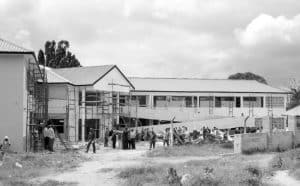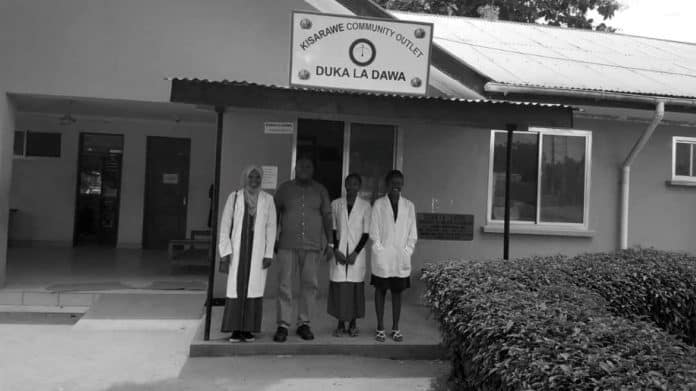Introduction to Kisarawe Hospital
Nestled in the heart of the Pwani Region, Kisarawe Hospital stands as a beacon of hope, delivering exceptional healthcare services to the surrounding rural communities. This state-of-the-art facility, founded with the vision of transforming the landscape of rural healthcare, has become a shining example of what can be achieved when innovation and compassion converge.
Kisarawe Hospital is more than just a healthcare provider; it is a testament to the power of community-driven initiatives and the unwavering commitment to improving the well-being of the people it serves. From its inception, the hospital has been driven by a deep understanding of the unique challenges faced by rural populations, and its mission has been to bridge the gap between urban and rural healthcare access.
Challenges of Rural Healthcare in the Pwani Region
The Pwani Region, like many rural areas in Tanzania, has long grappled with the complexities of providing quality healthcare to its residents. Geographical barriers, limited infrastructure, and a shortage of skilled medical personnel have been persistent obstacles that have hindered the region’s ability to deliver comprehensive and accessible healthcare services.
- Geographical Challenges: The Pwani Region is characterized by a vast, rugged terrain, with many remote villages scattered across the landscape. Navigating these distances and reaching the most vulnerable communities has been a constant challenge for healthcare providers.
- Infrastructure Limitations: The region’s limited road network and lack of reliable transportation options have made it difficult for patients to reach healthcare facilities, often forcing them to travel for hours to access basic medical care.
- Shortage of Medical Personnel: Attracting and retaining skilled healthcare professionals in rural areas has been a persistent challenge, leading to a significant shortage of doctors, nurses, and other medical staff in the region.
The Impact of Kisarawe Hospital on the Community

Recognizing these challenges, Kisarawe Hospital has taken a proactive approach to addressing the healthcare needs of the Pwani Region. Through its innovative programs and unwavering commitment to the community, the hospital has become a beacon of hope, transforming the lives of countless individuals.
- Improved Access to Healthcare: Kisarawe Hospital has strategically positioned itself to serve the surrounding rural communities, making it more accessible to those in need. The hospital’s comprehensive services, including outpatient clinics, inpatient wards, and specialized treatment facilities, have significantly reduced the distance and barriers that patients once faced.
- Enhanced Quality of Care: The hospital’s investment in state-of-the-art medical equipment, coupled with the expertise of its dedicated healthcare team, has enabled it to provide a higher standard of care to its patients. From advanced diagnostic tools to cutting-edge treatment procedures, Kisarawe Hospital is committed to ensuring that its patients receive the best possible care.
- Community Empowerment: Kisarawe Hospital has recognized the importance of empowering the local community to take an active role in their healthcare. Through various outreach programs and community engagement initiatives, the hospital has fostered a sense of ownership and responsibility among the people it serves, encouraging them to become active participants in their own well-being.
Innovative Healthcare Practices at Kisarawe Hospital
Kisarawe Hospital’s commitment to innovation has been a driving force behind its success in transforming rural healthcare in the Pwani Region. The hospital has embraced a multifaceted approach to delivering exceptional care, incorporating cutting-edge technologies, evidence-based practices, and collaborative partnerships.
- Telemedicine and Telehealth: Recognizing the challenges of geographic barriers, Kisarawe Hospital has invested in cutting-edge telemedicine and telehealth technologies. These innovative platforms allow the hospital to provide remote consultations, diagnoses, and even specialist care to patients in the most remote areas of the region, ensuring that they have access to the medical attention they need.
- Integrated Primary Care: Kisarawe Hospital has adopted a holistic approach to healthcare, focusing on the integration of primary care services. By offering a comprehensive range of services, including preventive care, chronic disease management, and health education, the hospital is able to address the diverse healthcare needs of the community, promoting overall well-being and reducing the burden on the healthcare system.
- Community-Based Interventions: Kisarawe Hospital has recognized the importance of tailoring its healthcare solutions to the specific needs of the local community. Through its community-based interventions, the hospital has developed targeted programs that address the unique challenges faced by different demographic groups, ensuring that no one is left behind.
Technology Advancements at Kisarawe Hospital
Kisarawe Hospital’s commitment to innovation extends beyond its healthcare practices; it has also been at the forefront of technological advancements in the Pwani Region. The hospital has embraced cutting-edge technologies to enhance its service delivery, improve patient outcomes, and streamline its operations.
- Electronic Health Records (EHR): Kisarawe Hospital has implemented a robust electronic health record system, which has revolutionized the way patient data is collected, stored, and accessed. This digitalization of medical records has improved the hospital’s efficiency, reduced the risk of errors, and enabled better coordination of care.
- Automated Inventory Management: The hospital has also invested in advanced inventory management systems, which use data-driven analytics to optimize the procurement, storage, and distribution of essential medical supplies. This has helped to ensure that the hospital always has the necessary resources on hand to provide uninterrupted care to its patients.
- Telemedicine and Teleradiology: In addition to its telemedicine capabilities, Kisarawe Hospital has also embraced teleradiology, allowing its patients to receive specialized diagnostic services remotely. This has been particularly beneficial for those living in remote areas, who would otherwise have to travel long distances to access these services.
Collaborations and Partnerships for Improved Healthcare Services
Kisarawe Hospital’s success in transforming rural healthcare in the Pwani Region has been further bolstered by its strong collaborations and partnerships with various stakeholders. By fostering these strategic alliances, the hospital has been able to leverage additional resources, expertise, and support to enhance its service delivery.
- Government Partnerships: Kisarawe Hospital has established close working relationships with the local and national government authorities, ensuring that its healthcare initiatives are aligned with the region’s broader health policies and priorities. This collaboration has enabled the hospital to access funding, resources, and policy support to drive its innovative programs.
- NGO Collaborations: The hospital has also forged partnerships with several non-governmental organizations (NGOs) and international development agencies, which have provided valuable technical assistance, funding, and capacity-building support. These collaborations have allowed Kisarawe Hospital to expand its reach and implement more comprehensive healthcare solutions.
- Private Sector Alliances: Recognizing the importance of leveraging private sector expertise and resources, Kisarawe Hospital has also cultivated partnerships with local and global private companies. These alliances have facilitated the introduction of cutting-edge technologies, the development of innovative healthcare models, and the mobilization of additional resources to support the hospital’s initiatives.
Community Outreach and Awareness Programs by Kisarawe Hospital
Kisarawe Hospital’s commitment to transforming rural healthcare extends beyond its clinical services; it has also placed a strong emphasis on community outreach and awareness programs. By engaging directly with the local population, the hospital has been able to address the unique healthcare needs and concerns of the community, empowering individuals to take an active role in their well-being.
- Health Education Campaigns: Kisarawe Hospital has launched a series of comprehensive health education campaigns, focusing on topics such as disease prevention, maternal and child health, and chronic disease management. These initiatives have been instrumental in raising awareness and promoting healthy behaviors within the community.
- Mobile Clinics and Outreach Events: The hospital has also implemented a mobile clinic program, which brings essential healthcare services directly to the doorsteps of remote villages. Additionally, the hospital organizes regular outreach events, such as health screenings and immunization drives, to ensure that even the most marginalized members of the community have access to the care they need.
- Community Engagement Initiatives: Kisarawe Hospital has fostered a strong sense of community ownership by involving local residents in the planning and implementation of its healthcare programs. Through regular town hall meetings, feedback sessions, and community advisory boards, the hospital ensures that the voices of the people it serves are heard and incorporated into its decision-making processes.
Future Plans and Expansion of Kisarawe Hospital

As Kisarawe Hospital continues to make significant strides in improving rural healthcare in the Pwani Region, the hospital’s leadership is already looking towards the future, with ambitious plans for expansion and continued innovation.
- Capacity Expansion: Recognizing the growing demand for its services, Kisarawe Hospital is committed to expanding its physical infrastructure, including the construction of new wards, specialized treatment centers, and state-of-the-art diagnostic facilities. This expansion will enable the hospital to serve an even larger population and provide a wider range of healthcare services.
- Workforce Development: The hospital’s leadership understands the critical role that skilled healthcare professionals play in delivering high-quality care. To address the region’s shortage of medical personnel, Kisarawe Hospital is investing in comprehensive training programs, scholarships, and incentives to attract and retain top talent in the field.
- Technological Advancements: Kisarawe Hospital’s commitment to innovation will continue to drive its adoption of cutting-edge technologies, such as advanced telemedicine platforms, artificial intelligence-powered diagnostic tools, and data-driven healthcare management systems. These technological advancements will further enhance the hospital’s ability to provide accessible, efficient, and personalized care to its patients.
- Strengthening Partnerships: Recognizing the value of collaborative efforts, Kisarawe Hospital plans to deepen its existing partnerships with government agencies, NGOs, and private sector entities. By fostering these strategic alliances, the hospital will be able to leverage additional resources, expertise, and funding to expand its reach and impact within the Pwani Region.
- Community-Centric Approach: At the heart of Kisarawe Hospital’s future plans is a steadfast commitment to its community-centric approach. The hospital will continue to prioritize the unique needs and concerns of the local population, ensuring that its healthcare solutions are tailored to the specific challenges faced by the people it serves.
Discover how Kisarawe Hospital is transforming rural healthcare in the Pwani Region. Contact us today to learn more about our innovative programs and how you can get involved in supporting our mission.
Conclusion: The Role of Kisarawe Hospital in Transforming Rural Healthcare in the Pwani Region
Kisarawe Hospital’s journey in the Pwani Region has been a testament to the power of innovation, collaboration, and community-driven healthcare. By addressing the unique challenges of rural healthcare, the hospital has emerged as a shining example of what can be achieved when a dedicated team of healthcare professionals, technologists, and community advocates come together to improve the well-being of the people they serve.
Through its comprehensive services, cutting-edge technologies, and deep-rooted community engagement, Kisarawe Hospital has not only transformed the lives of its patients but has also inspired a new vision for rural healthcare in Tanzania. As the hospital continues to expand its reach and deepen its impact, it is poised to become a model for healthcare providers across the country, demonstrating that accessible, high-quality care is not just a dream, but a reality that can be achieved.
For more articles related to Hospitals in Tanzania, click here

































